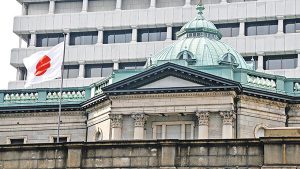Bloomberg
Traders piled into bets on another hawkish pivot from the Bank of Japan (BOJ) following a report that the central bank will review the side effects of its policy as soon as next week.
The yen gained more than 1% and Japanese bond futures slid after the Yomiuri newspaper said the BOJ will consider adjusting bond purchases or other policy changes to counter turbulence caused by tweaks to its yield-curve control settings last month.
Bond futures tumbled even as the BOJ spent a record 2.8 trillion yen ($21.3 billion) on its fixed-rate bond-purchase operations on Thursday to stop cash yields from rising above the upper end of its allowed trading range.
“We now expect the Bank of Japan to widen the yield-curve control range by 50 basis points in March,†BNP Paribas SA strategists including Ryutaro Kono in Tokyo wrote in
a research note. There is “risk
of an action as early as the
January meeting,†they said.
Investors around the world are ramping up bets that the BOJ will be compelled to exit its ultra-dovish settings after it has doggedly clung to the policy even as its major counterparts have tightened. Such
a move would reverberate around the globe by triggering off further strength in the yen and potentially luring hundreds of billions in dollars of capital back to Japan.
Strategists expect further policy tweaks from the BOJ in coming months, especially as a new governor is set to take over from Haruhiko Kuroda in April. The BOJ’s decision to double its allowed ceiling for the 10-year yield to 0.5% in December wasn’t the beginning of an exit of monetary easing, but a way
to make it more sustainable, Kuroda said last month.
The yen extended gains against the dollar into the European trading session, rallying as much as 1.2% to 130.89 on Thursday, nearing a six-month high set earlier this month. Japanese 10-year bond futures dropped to the lowest since May 2014.
Japan’s currency has surged about 16% from a low set in October amid government intervention, a winding back of bets on Federal Reserve interest-rate hikes, and speculation over hawkish BOJ policy shifts.
“Expectations for the BOJ to exit its ultra-accommodative policy will remain a headwind for dollar-yen,†Carol Kong, an economist and currency strategist at Commonwealth Bank of Australia in Sydney, wrote in a note. “Ten-year Japanese government bond futures and swap rates also remain elevated at just under 1%, indicating market expectations for more hawkish policy adjustments.â€
The cost of buying option contracts to hedge against moves in the yen has risen as traders braced for the impact of US inflation data and the next Bank of Japan policy decision on January18. One-week implied volatility in dollar-yen — a gauge of expectations of swings over that time frame — has climbed to the highest level since October.
 The Gulf Time Newspaper One of the finest business newspapers in the UAE brought to you by our professional writers and editors.
The Gulf Time Newspaper One of the finest business newspapers in the UAE brought to you by our professional writers and editors.
